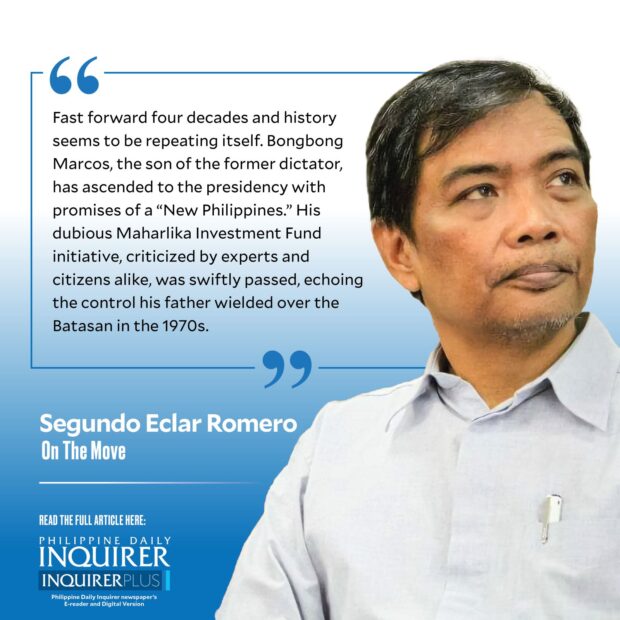Return of dark days but without martial law
In the annals of Philippine history, the martial law regime imposed by Ferdinand Marcos Sr. from 1972 to 1981 stands as a stark reminder of how power can corrupt absolutely. Under the pretense of building a “New Society,” the Marcos regime deteriorated into a plunderous era that corrupted government institutions, confiscated businesses, and violated democratic principles. While the Philippines has ostensibly moved beyond martial law, disturbing parallels are emerging, signaling the return of impunity under President Ferdinand Marcos Jr.
The Marcos era witnessed the degradation of once-respected institutions like the Central Bank of the Philippines, which was shamelessly treated as a personal bank account. The regime orchestrated the confiscation of businesses and properties from perceived enemies, handing them over to cronies in a blatant display of nepotism. Grand fund concentration schemes like the coco levy drained resources from impoverished coconut farmers, enriching a privileged few. The ratification of the 1973 Constitution through mere hand-raisings in barangay assemblies eroded democratic values.
Article continues after this advertisementThe nadir was reached during the 1977 legislative elections when Imelda Marcos improbably emerged victorious while Benigno S. Aquino Jr. lost in Metro Manila—a result that defied credibility. The cacophonic noise barrage that greeted the results said it all. Only the collective will of the people, who took to the streets again to declare “enough is enough” prevented Marcos Sr. from successfully stealing the February 1986 snap presidential elections.
Fast forward four decades and history seems to be repeating itself. Bongbong Marcos, the son of the former dictator, has ascended to the presidency with promises of a “New Philippines.” His dubious Maharlika Investment Fund initiative, criticized by experts and citizens alike, was swiftly passed, echoing the control his father wielded over the Batasan in the 1970s.
Now, the Marcos Jr. regime is tapping into the nation’s coffers with a brazenness that surpasses past transgressions. A staggering P125 million in confidential fund was unlawfully transferred to Vice President Sara Duterte, a clear violation of the law barring such transfers.
Article continues after this advertisementThese two highest offices in the land appear to be opening the floodgates for national plunder, as they amass colossal confidential and intelligence funds, evading the scrutiny of the government and the people. Senate investigations into the propriety of these entitlements and fund usage were abruptly curtailed by complicit senators and congressmen.
Furthermore, the Philippines finds itself embroiled in controversy over the legitimacy of the May 2022 elections. The Truth and Transparency (TNT) trio has made grave allegations of election manipulation against the Commission on Elections (Comelec). Astonishingly, President Marcos and the Comelec have refrained from addressing these charges, undermining the very essence of democracy.
Mr. Marcos, who was previously convicted of tax evasion, was constitutionally disqualified from running in the 2022 elections. Yet, the Comelec’s failure to make a ruling allowed him to participate. This sequence of events paints a disconcerting picture—the Philippines appears to be slipping into another era of presidential impunity without the need for martial law.
This state of affairs is facilitated by the complicity of elites and the new cronies of the president. The Vice President, much like Imelda Marcos during her husband’s regime, seems to thrive in an atmosphere of impunity. It is a grim reality: impunity no longer requires martial law; it thrives on state capture, weak institutions, and a pliant Congress. The support of past presidents Gloria Macapagal Arroyo and Rodrigo Duterte only bolsters this climate of impunity.
The marshaling of intelligence forces to quash leftist movements is reminiscent of the martial law era. These conditions persist without the need for a martial law declaration, as the opposition has been silenced, completing the grim picture of unchecked impunity.
Furthermore, the Department of Education seeks to sanitize the odious history of martial law by removing references to Marcos Sr.’s dictatorship from textbooks for Filipino students. This parallels the censorship that Marcos Sr. imposed under martial law, rewriting history to fit his narrative.
Additionally, new alliances with the United States in the realm of national defense and foreign policy seem to have emboldened the President’s confidence. He appears to regard himself as indispensable to the United States, mirroring Marcos Sr.’s successful quest for American acquiescence to his martial law regime in 1972.
As Filipinos, we must reflect on this alarming trajectory and remember the lessons of our history. Impunity should never be allowed to take root in our democracy, and we must hold those in power accountable. It is incumbent upon us to safeguard the principles of transparency, accountability, and justice that underpin our nation’s democratic foundations.
—————-
















